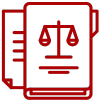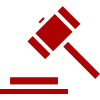Pardons
There are two ways to obtain a pardon.
The first way is through the Nebraska Board of Pardons.
- The Board of Pardons has the authority to grant a pardon for any conviction.
- A Pardon from the Board of Pardons is the only way to restore gun rights that were removed as the result of a conviction.
- The Board may grant you a pardon with or without restoring your gun rights (if your gun rights had been taken away).
This page contains information and instructions for pardons through the Nebraska Board of Pardons.
The second way is a Mayoral Pardon.
- A mayoral pardon is for violations of the city code and is available only for offenses occurring in Lincoln or Omaha.
- There are different requirements for eligibility for Mayoral Pardons.
- You should check your city’s website for requirements and instructions to obtain a Mayoral Pardon.
A pardoned conviction is eligible to be sealed.
 Information About Pardons
Information About Pardons
Eligibility to apply for a pardon.
The Board of Pardons sets the following requirements:
- Completed application.
- Other required documents include:
- three letters of reference; and
- applicable court documents.
- The conviction must be a type that will be heard by the Board.
- If you were convicted of a felony, you must wait 10 years to file an Application for a Pardon.
- If you were convicted of a misdemeanor, you must wait 3 years to file an Application for a Pardon.
- During this wait period, you must not have had contact with law enforcement or additional convictions, otherwise the wait period will start over.
- Evidence consistent with rehabilitation
- Evidence consistent with remorse
The Nebraska Board of Pardons will not consider convictions for:
- traffic violations,
- driving under the influence, or
- driving under suspension.
A Pardon does not say you are innocent, but that you have reformed.
- The Board does not consider claims of innocence.
- The Board will not review the legal proceedings in your case.
The Board wants to know you are remorseful and understand how the acts were harmful.
The Board of Pardons will consider evidence consistent with rehabilitation and remorse.
 To complete the forms and participate in the court hearing, I will need:
To complete the forms and participate in the court hearing, I will need:
Step By Step Process
 First Step:
First Step:
- Get the forms needed on this page:
- Complete an application.
- Include the following:
- Reference Letters
- The Board requires at least 3 reference letters which can be written by friends, family, co-workers, or anyone who can speak positively about you and speak to how you have changed your behavior.
- Required Court Documents
- Sentencing Order
- Probation Order (if applicable)
- Release from Probation Order (if applicable)
- A receipt or letter from the sentencing court showing all fines have been paid.
- Optional court documents:
- Discharge Certificate
- Certificate of Completion of Probation
- Certificate of Completion of Community Service
 Filing your request
Filing your request
- Submit the application to the Board of Pardons
- Wait for the hearing.
Second Step: Attend and testify at a hearing before the Board of Pardons.
- The Nebraska Board of Pardons will send a notice of hearing after you file the application.
- It may take several years to be called up for a hearing.
- The Board holds hearings 3-4 times per year at the State Capital, however they can decide to hold hearings more or less often.
- The hearings are usually at 1:30 pm. If you are scheduled for a hearing, it does not necessarily mean your application is approved, but it means you will be given an opportunity to state your case.
- The Board may deny your application without providing you with a hearing.
 On Your Hearing Day
On Your Hearing Day
- You must go to the hearing and testify (talk under oath).
- Try to arrive at your hearing at least 15 minutes before your hearing is scheduled.
- At the hearing, the Board will call you forward, swear you in, and ask you to say a few words about why you are seeking a pardon.
- You may testify to the following:
Introduce Yourself. Example: My name is (your full name). I live at (your current street address) , in (city and state where currently living), and I am the person requesting a pardon.
Explain why you feel that the Board should grant your pardon.
Explain what you have done to make things better since the offense.
Describe for the Board of Pardons efforts you have made.
Here are some examples:
How you have behaved after the case (how you have conducted yourself since); your response to diversion, mediation, probation, supervision, other treatment or rehabilitation program, or sentence; your education and employment history since the offense; any other circumstances that may relate to your rehabilitation.
You may wish to mention why you are remorseful and steps you have taken to rehabilitate.
- The Board may ask you questions to clarify a fact in the application or confirm you are remorseful.
- This is not a hearing to prove your innocence at the original trial.
- You are not asking for a re-trial.
- This is not your chance to argue about the original conviction or charges.
- This is your chance to ask the court to pardon your conviction because you have rehabilitated.
- You may also want to consider bringing someone to testify on your behalf, like a friend, probation officer, or mentor.
- Next, the Board will vote.
- The Board may impose certain conditions in your Pardon, like attending community programs.
- The Board may grant you a pardon with or without restoring your gun rights (if your gun rights had been taken away).
- If your pardon is granted, you will receive a certificate in the mail in a few weeks.
Other tips:
- On the date you are scheduled for the hearing, it is encouraged to arrive early. But no matter what, do not be late.
- Dress appropriately.
- When you approach the Board, be respectful. Do not argue with them.
You should always check the Nebraska Board of Pardons Website and your City’s Website as they may publish updates that are not reflected on this page.
Specific filing requirements can be found there.
